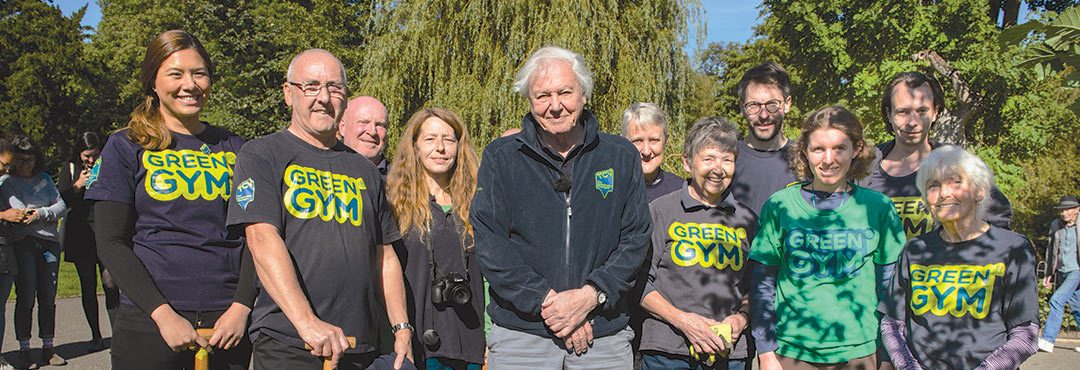A brief history of The Conservation Volunteers from its early beginnings to the present day.
The Conservation Volunteers' roots are established through the creation of the Conservation Corps.
1959
Brigadier Armstrong is appointed by Council for Nature to form the Conservation Corps in order to involve volunteers in practical conservation work.
First project held at Box Hill in Surrey. Forty two volunteers, including David Bellamy, clear dogwood to encourage the growth of juniper and the distinctive chalkland flora.
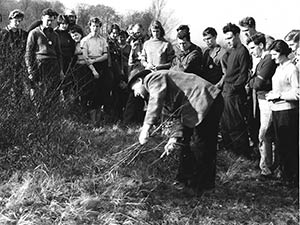
The Conservation Corps expands its programme of practical tasks with most practical work taking place at nature reserves in the countryside.
1964
Conservation Corps expands its activities to include education and amenity work in the countryside.
1966
Conservation Corps moves from a basement office at Queen's Gate, Kensington to new premises at London Zoo in Regent's Park.
1968
The first training course for volunteers marks the beginning of an ongoing commitment to the provision of training for volunteers and staff.
1969
Membership has increased to 600 and volunteers are completing 6,000 work days per year.
The first ever international exchange visit to the former Czechoslovakia, where volunteers study the wildlife and land management of the Low Tatra Mountains paves the way for a series of international exchanges, resulting ultimately 20 years later in the international project programme.

The Conservation Volunteers is established as an independent organisation and opens up offices around England, Wales and Scotland. Volunteer numbers continue to rise.
1970
Conservation Corps takes over its own responsibilities and operates under the new name of British Trust for Conservation Volunteers (BTCV). The new logo is launched.
Sir David Attenborough becomes Vice President and HRH Duke of Edinburgh KG KT becomes Patron.
1971
Local group affiliation scheme is launched. By 1974 a total of 57 groups have joined.
1972
Conserver magazine makes its debut and the Cooks Handbook and Organising a Local Conservation Group are published, both as a result of volunteer effort.
1974
The number of registered volunteers reached 3,000
1975
"Conservation Corps Week" in October results in a dramatic rise in enrolment and a BTCV membership scheme is introduced.
1977
As part of Jubilee year, TCV works with Environment Committee of the London Queen's Silver Jubilee Committee to set up a unique ecological park opposite Tower of London.
1979
TCV moves to new headquarters in Reading.
The first group from Northern Ireland affiliates to TCV.
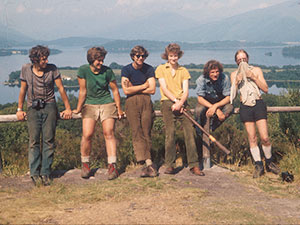
The focus of BTCV's activities begins to shift to include the urban environment and community action.
1981
There are 350 local groups affiliated to TCV and the number of BTCV Natural Breaks has reached 280 per year.
1983
A separate Northern Ireland region is established as Conservation Volunteers Northern Ireland (CVNI).
Midweek projects are introduced with the aim of engaging unemployed and retired people in conservation work.
1984
TCV's new Wallingford headquarters are officially opened.
TCV celebrates its 25th birthday with a commemorative task at Boxhill in Surrey.
1985
Conservation Practice Ltd (CPL) is established as TCV's trading subsidiary.
1988
In response to the losses incurred by the 1987 hurricane, TCV launches a National Tree Planting Campaign, with the support of Esso and the Countryside Commission.
A European Commission grant enables TCV to employ an International Development Officer to establish working holidays in each European country.
1989
Membership has grown to 10,000 - over 25 times the number involved in 1959 and the Natural Break programme is the largest of its kind in Britain, involving over 6,000 people each year.
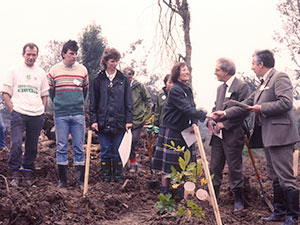
TCV expands throughout the decade.
The emphasis is on people and society as well as the environment with TCV emerging towards the end of the 1990s as a key player in initiatives such as the government's New Deal and Millennium Volunteers programmes.
1990
Conservation Volunteers Ireland is established. This is the first independent organisation established as a direct result of TCV's International Conservation Action Network, funded by the European Commission.
1991
TCV's Three Year Million Tree Campaign reaches its target with the planting of the millionth tree by Vice President David Bellamy at Watergrove Reservoir in Lancashire.
CVNI celebrates its 10th anniversary with Professor David Bellamy.
The 1000th Local Group joins TCV's Local Group Membership Scheme.
1995
The government-supported Environmental Training Organisation, of which TCV is a founder member, is launched to promote high quality training in the environmental sector.
1998
TCV joins forces with Dr William Bird of Sonning Common Health Centre in Oxfordshire to introduce the BTCV Green Gym project.
TCV launches its new Urban Handbook, funded by Barclays plc and its new Position Paper Working with People in Towns and Cities at its first Urban Environment Day attended by Michael Meacher MP, Minister for the Environment and Professor Chris Baines.
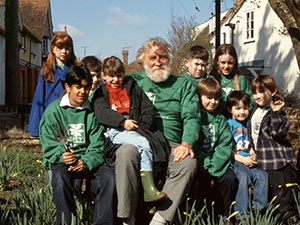
TCV becomes one of the largest environmental sector providers of training and support to unemployed people in the UK.
2001
TCV secures its first contract with a Learning Skills Council to deliver apprenticeships.
2002
The foot and mouth epidemic has a major impact on rural activities. TCV staff and volunteers work hard to make up for lost volunteer and environmental opportunities. Despite the outbreak, TCV achieves its highest recorded workdays total, over a quarter of a million days.
2006
TCV launches Spring into Action backed by TV gardener Charlie Dimmock and supported by Prudential, the Cabinet Office and BBC Breathing Places. The six week campaign engages nearly 19,000 volunteers.
Sedum House, TCV's new head office, is opened in Doncaster by Ed Miliband, Minister for the Third Sector. It wins awards for its environmentally sustainable design.
TCV's Patron HRH The Duke of Edinburgh gives out the first BTCV Green Hero Awards, recognising the dedication and achievements of TCV volunteers and groups.
2008
TCV announces a new partnership with The Royal Bank of Scotland Group (RBS) for employee volunteering events across the UK.
The Green Gym celebrates its 10th Anniversary. More than 70 Green Gyms are now in operation across the UK.
TCV publishes social return on investment research that shows £1 invested in environmental volunteering can lead to a return of up to £4.
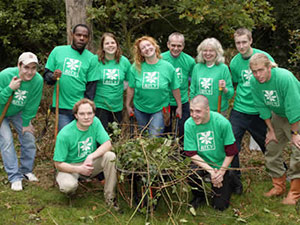
BTCV becomes known as The Conservation Volunteers (TCV) with a focus on strengthening communities and promoting health through green space volunteering.
2011
TCV opens the Greenwich Meantime Nursery, a unique project using vacant development land to create a resource for nature conservation, biodiversity and sustainability.
2012
Health for Life – a unique food growing programme launches in Birmingham. Funded by Mondelez International Foundation and run in partnership with Birmingham Health Education Service, the programme promotes fun activities that engage people in growing food, physical activity, healthy eating and cookery.
2013
TCV’s Natural Communities Apprenticeship Programme launches, providing trainees with a practical and flexible methodology for engaging everyone to enjoy, understand, value and care for the green places around them.
2014
TCV welcomes Jonathon Porritt as President
2015
TCV launches a new partnership with OVO Energy to get the UK planting as part of the exciting ‘I Dig Trees’ planting programme. On behalf of its Greener Energy Plan, OVO funded over 158,000 free trees for volunteers and community groups to plant across the UK.
2015 was a year of considerable growth and recognition for TCV's Green Gym. This growth was supported by funding from the Cabinet Office and innovation foundation, Nesta.
Green Gym wins a coveted Health and Wellbeing Award from the Royal Society for Public Health. These awards recognise achievements in the promotion of health and wellbeing through policies that empower communities and individuals, improve the population’s health and address the wider social determinants of health.
2016
TCV celebrates our Vice President, Sir David Attenborough 90th birthday. Volunteers, staff and supporters of TCV join Sir David in Waterlow Park in North London to plant an elm tree in his honour.
TCV’s Natural Talent programme has run for 10 years filling the substantial gap in ecological skills across the UK. 95% of Natural Talent trainees are now active in the conservation sector, using skills and expertise gained with TCV.
2017
TCV’s Green Gym features in a new study commissioned by BBC2’s Trust Me I'm A Doctor to investigate the effects of different activities on stress levels.
TCV’s practical conservation handbooks are digitised and available for a modest subscription, providing practical guidance to create and manage many aspects of rural and urban green spaces.
TCV receives significant, long-term funding from players of People's Postcode Lottery, to support our volunteering programmes in community green spaces.
2018
TCV’s Green Gym received funds from Big Lottery Fund, raised by players of The National Lottery, to develop the quality assurance processes for social prescribing. This innovative project linked with the NHS across the UK and supported the scaling of social prescribing nationwide. November saw the first national social prescribing conference which we co-developed with the King’s Fund. The conference was a huge success, attracting over 400 delegates, the Secretary of State for Health, and contributors from across the UK.
2018 was the 20th year of TCV’s Green Gym and to celebrate, various Green Gyms from South Oxfordshire hosted a giant work session.
2019
In celebration of our 60th anniversary we announced free membership of the TCV Community Network across the UK, supported in Great Britain by players of People’s Postcode Lottery.
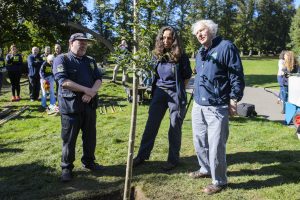
When the Covid-19 pandemic arrived, we took a step that was unprecedented in our history – ceasing our volunteering programmes. Volunteering slowly resumed to our average levels and we focused our strategy to connect people and green spaces to deliver lasting outcomes for both.
2020
We were part of the iconic celebrity fundraising event, ICAP Charity Day, allowing us to engage and educate 15,000 schoolchildren in the great outdoors through the ICAP Fruit Tree Initiative – From the Ground Up!
With 32,000 native trees, we planted the largest mini urban forest in Europe - the Forest of Thanks in Barking - as a thank you to all the key front-line workers and NHS staff that did so much for their communities during the pandemic. The forest was created using the Miyawaki method.
2021
TCV became a delivery partner of The Queen’s Green Canopy (QGC), a unique tree planting initiative which invites people from across the United Kingdom to “Plant a Tree for the Jubilee.”
TCV announced a new partnership with National Museums NI, which saw its North Down operations and native tree nursery move after many years at the Clandeboye estate to the grounds of the Ulster Folk Museum at Cultra.
TCV exhibited our work in the COP26 Green Zone in Glasgow and in the Google Arts and Culture virtual green zone. COP26 volunteers also took practical action to improve local green spaces in a series of ‘hands-on’ conservation days run by TCV in Glasgow.
2024
The incredible impact of TCV volunteers was valued at £128.5m by external sustainability consultants.
TCV was honoured to announce His Majesty The King as our new Royal Patron.
We launched a new tree nursery with partner Royal Bank of Scotland.
We re-launched TCV’s definitive handbooks by updating their digital versions and provided TCV’s Community Network with a brand new resource library.
We rounded off the year with our first face-to-face TCV Hero Awards since the pandemic and celebrated our anniversary at this special event too.
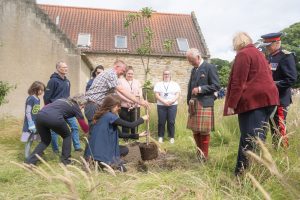
Celebrating TCV's history
TCV celebrated its 65th Anniversary in 2024. Sixty-five years since the first volunteers gathered at Box Hill to help protect the local wildlife. Have a browse of our website that shares TCV stories from the volunteers, staff and supporters who have been part of our journey - we would love to read yours!
We are proud of our history - please look through our photographic archive and let us know if they stir any memories, we are always delighted to hear from our past volunteers.

